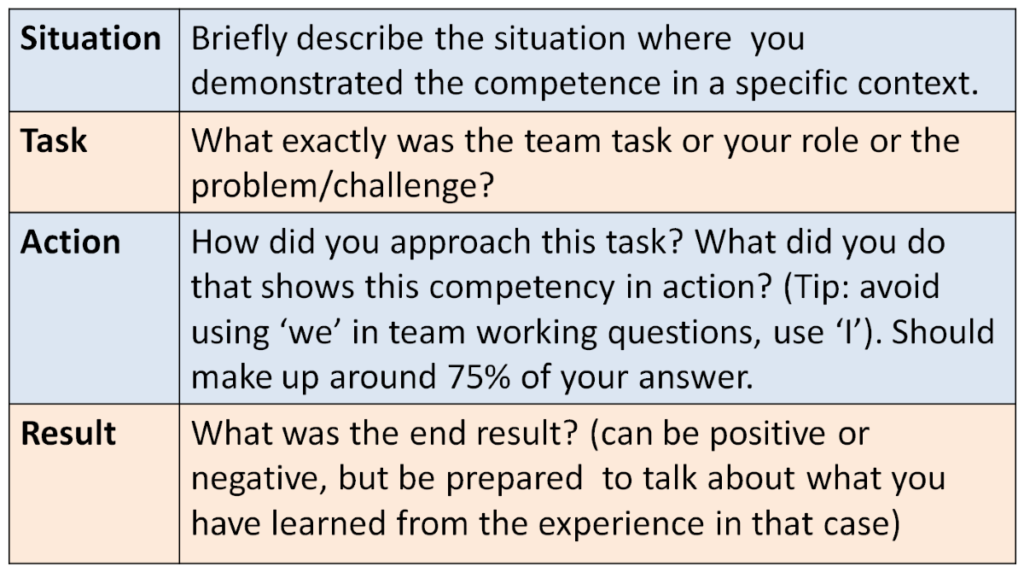An interview is your chance to give a good account of yourself, and show potential employers why you are suitable for the job.
Preparation is key! Here are some handy tips that can help you feel more prepared and ready for your interview:
- Check in advance where the interview will be held, and then work out how to get there and arrive with plenty of time to spare. Remember, some interview venues, such as hospitals and universities, can be large and busy places – make sure you know exactly where you need to be for your interview.
- Remember the interview panel is on your side. You have been invited to the interview because they liked your application form and want to know more about you.
- Listen carefully to the questions they ask, and answer them as clearly as you can. Look at the STAR method below to help you practice structuring your respones.
- Be prepared to demonstrate your understanding of the organisation’s values and how you would apply them in your everyday work.
- Don’t rush your answers, instead think about how to respond before giving your answer. If there is something in the question you don’t understand, ask for clarification.
- Prepare in advance any questions you might want to ask the panel and take full advantage of the opportunity to ask these questions at the end of your interview.
STAR Interview Technique
What is the STAR method?
This is a nice easy way of remembering everything you need to include in your responses during an interview and making sure you don’t leave out any important bits.
The STAR method helps candidates walk through their stories in a logical, clear manner.

Example of using the STAR method
Q: Give me an example of your ability to use Analytical Skills.
A: I’m good at Excel and have created several spreadsheets to improve processes.
What is missing from this STAR?
- Didn’t describe the situation
- Actions are missing
- Results are vague
Interviewer will likely ask follow up questions, therefore, a better example would be as follows:
Example Question 1: Tell me about a time you had to complete a task within a tight deadline. Describe the situation, and explain how you handled it.
- Answer: While I typically like to plan out my work in stages and complete it piece by piece, I can also achieve high-quality work results under tight deadlines. Once, at a former company, an employee left days before the imminent deadline of one of his projects. I was asked to assume responsibility for it, with only a few days to learn about and complete the project. I created a task force and delegated work, and we all completed the assignment with a day to spare. In fact, I believe I thrive when working under tight deadlines.
Example Question 2: Tell me about a time you showed initiative on the job.
- Answer: Last winter, I was acting as an account coordinator, supporting the account executive for a major client at an ad agency. The account executive had an accident and was sidelined three weeks before a major campaign pitch. I volunteered to fill in and orchestrate the presentation by coordinating the input of the creative and media teams. I called an emergency meeting and facilitated a discussion about ad scenarios, media plans, and the roles of various team members in relation to the presentation. I was able to achieve a consensus on two priority ad concepts that we had to pitch, along with related media strategies. I drew up a minute-by-minute plan of how we would present the pitch that was warmly received by the team based on our discussions. The client loved our plan and adopted the campaign. I was promoted to account executive six months later.
For further information on the STAR and how to use it, visit this useful link.
